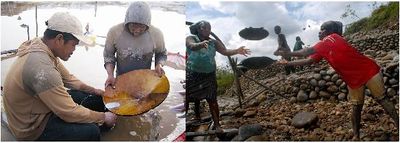Human exposure to Mercury: Difference between revisions
| Line 61: | Line 61: | ||
== References == | == References == | ||
Both urine and hair mercury levels were high in participants having direct contact with mercury<ref>Paruchuri, Y., Siuniak, A., Johnson, N., Levin, E., Mitchell, K., Goodrich, J. M., Elisha, P.R., & Basu, N. (2010). Occupational and environmental mercury exposure among small-scale gold miners in the Talensi–Nabdam District of Ghana's Upper East region. Science of the Total Environment, 408(24), 6079-6085</ref> | |||
<ref>Paruchuri, Y., Siuniak, A., Johnson, N., Levin, E., Mitchell, K., Goodrich, J. M., Elisha, P.R., & Basu, N. (2010). Occupational and environmental mercury exposure among small-scale gold miners in the Talensi–Nabdam District of Ghana's Upper East region. Science of the Total Environment, 408(24), 6079-6085</ref> | |||
<references/> | <references/> | ||
== Related files == | == Related files == | ||
Revision as of 07:57, 12 April 2015
- Put your own username in moderator=Username unless someone else takes care of the page content.
- Add at least category using the [[Category:Name of category]] tag.
- When the page is quite developed, change stub=No
This box of text can removed. }}
| Moderator:Aishat Bukola Ayelotan (see all) |
| This page is a stub. You may improve it into a full page. |
| Upload data
|
Scope
This assessment is based on activities of small scale gold mine and its mercury release to the environment Mercury is a ubiquitous heavy metal in the environment. Small scale artisanal gold mining contributes more to its amount in the environment. Humans are vulnerable to its intoxication, most especially children
Question
Does small scale artisanal gold mining activities pose adverse effects on humans.
Intended use and users
Participants
The residents in a gold mine area and the gold miners will be recruited in a mining community
Boundaries
Urine and hair mercury levels are to be measured for all the participants, ensuring all the participants consume fish from the lake in the community. Surveys will be given to the participants to know how often they consume fish from the lake, who amongs them have contact with mercury and how often.
Decisions and scenarios
What measures should be taken, if the mercury level in the participants are above the WHO requirements? What protective measures should be proposed concerning the small scale artisanal gold mining?
Timing
The study will be continous to determine the mercury level in the participants and to observe any health effect, if any. The assessment will be made every 2months as hair mercury level has half life of 35-100days and decision will be made after 6months of commencement of the assessment based on the study results.
Answer
Results
Both urine and hair mercury levels were high in participants having direct contact with mercury. Hair mercury level was also high in participants that consumes fish at least once on a weekly basis while there was no significant difference in the urine level

Conclusions
Exposure to mercury from small scale artisanal gold mining poses serious threat to human health.Thus, the workers will be enlightened on taking necessary protective measures like chemical protective clothing and safety goggles. Also, mercury-alternates for amalgamation would be prescribed. Waste release from the mine will be controlled due to it effect on the aquatic ecosystem which indirectly affect humans through food chain
Rationale
Upload a causal diagram and change the right name here.

Stakeholders
These are the city council as they are the decision makers, owners of the small scale gold mine and the populace. The populace are directly or indirectly affected healthwise as they consume fish from the lake and work in the gold mine.
Dependencies
Decisions are made by the decision holders based on the results.
Analyses
Indices
Non-marginal indices of gender,occupation and fish consumption were used.
Calculations
See also
Mercury risk assessment
Keywords
Mercury exposure,effect of mercury, mercury assessment
References
Both urine and hair mercury levels were high in participants having direct contact with mercury[1]
- ↑ Paruchuri, Y., Siuniak, A., Johnson, N., Levin, E., Mitchell, K., Goodrich, J. M., Elisha, P.R., & Basu, N. (2010). Occupational and environmental mercury exposure among small-scale gold miners in the Talensi–Nabdam District of Ghana's Upper East region. Science of the Total Environment, 408(24), 6079-6085